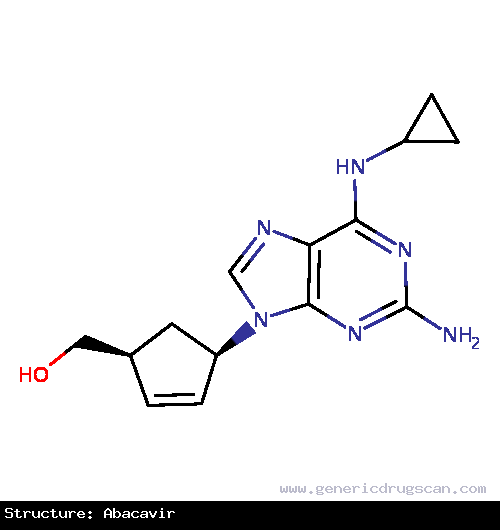Abacavir Drug: Indication, Dosage, Precaution, Side Effect , Storage, Category Type and corresponding Brands - www.genericdrugscan.com
Abacavir
Drug Status in USA : ApprovedDrug Status in Canada : Approved
pronunciation
pronounced as (a ba ka' vir)
Why is this medication prescribed?
Abacavir is used along with other medications to treat human immunodeficiency virus (HIV) infection. Abacavir is in a class of medications called nucleoside reverse transcriptase inhibitors (NRTIs). It works by decreasing the amount of HIV in the blood. Although abacavir does not cure HIV, it may decrease your chance of developing acquired immunodeficiency syndrome (AIDS) and HIV-related illnesses such as serious infections or cancer. Taking these medications along with practicing safer sex and making other lifestyle changes may decrease the risk of transmitting (spreading) the HIV virus to other people.
How should this medicine be used?
Abacavir comes as a tablet and a solution (liquid) to take by mouth. It is usually taken once or twice daily with or without food. Take abacavir at around the same time(s) every day. Follow the directions on your prescription label carefully, and ask your doctor or pharmacist to explain any part you do not understand. Take abacavir exactly as directed. Do not take more or less of it or take it more often than prescribed by your doctor.
Tell your doctor if you or your child are unable to swallow the tablets.
Abacavir helps to control HIV infection but does not cure it. Continue to take abacavir even if you feel well. Do not stop taking abacavir without talking to your doctor. If you stop taking abacavir or skip doses, your condition may become more difficult to treat or you could have an allergic reaction when restarting the medication (See Important Warning section). Do not run out of medication. When your supply of abacavir starts to run low, get more from your doctor or pharmacist.
What are the precautions to be followed?
Before taking abacavir,- tell your doctor and pharmacist if you are allergic to any medications or any of the ingredients in abacavir tablets or solution. Ask your pharmacist for a list of the ingredients.
- tell your doctor and pharmacist what prescription and nonprescription medications, vitamins, nutritional supplements, and herbal products you are taking. Be sure to mention the following: methadone (Dolophine, Methadose); and other medications to treat HIV. Your doctor may need to change the doses of your medications or monitor you carefully for side effects.
- in addition to the condition listed in the IMPORTANT WARNING section, tell your doctor if you have or have ever had depression, diabetes, high blood pressure, high cholesterol, or heart disease.
- tell your doctor if you are pregnant or plan to become pregnant. If you become pregnant while taking abacavir, call your doctor.
- tell your doctor if you are breastfeeding or plan to breastfeed. You should not breastfeed while taking abacavir.
- talk to your doctor about the safe use of alcohol while taking this medication.
- tell your doctor if you smoke.
- you should know that while you are taking medications to treat HIV infection, your immune system may get stronger and begin to fight other infections that were already in your body, such as pneumonia, herpes virus, tuberculosis, hepatitis, Graves' disease (condition where the body attacks the thyroid gland causing it to be overactive), polymyositis (condition that causes muscle weakness), Guillain-Barr? syndrome (weakness, tingling, and possible paralysis due to sudden nerve damage), or a fungal infection. If you have a fever or new infection symptom after starting treatment with abacavir, be sure to tell your doctor.
- you should know that while you are taking abacavir your body fat may increase or move to different areas of your body, such as the back of your neck and upper shoulders ('buffalo hump'), stomach, and breasts. Your body may lose fat from your arms, legs, face, and buttocks. Talk to your doctor if you notice any of these changes in your body fat.
What are possible side effects of this medication ?
Abacavir may cause side effects. Tell your doctor if any of these symptoms are severe or do not go away:- headache
- depression
- anxiety
- dreams or sleep problems
- ear, nose, throat infections, especially in children
- blisters or peeling skin
- hives
- itching
- difficulty swallowing or breathing
- chills
Abacavir may cause other side effects. Call your doctor if you have any unusual problems while taking this medication.
How to store the medication and dispose it of after its use later?
Keep this medication in the container it came in, tightly closed, and out of reach of children. Store the tablets at room temperature and away from excess heat and moisture (not in the bathroom). Store the oral solution at room temperature or in the refrigerator, but do not freeze it.
Unneeded medications should be disposed of in special ways to ensure that pets, children, and other people cannot consume them. However, you should not flush this medication down the toilet. Instead, the best way to dispose of your medication is through a medicine take-back program.
Drug Category/Class
- Anti-HIV Agents
- Reverse Transcriptase Inhibitors
- Nucleoside and Nucleotide Reverse Transcriptase Inhibitors
- Antiinfectives for Systemic Use
- Direct Acting Antivirals
- Antivirals for Systemic Use
- Nucleoside and nucleotide reverse transcriptase inhibitors
- Antivirals for treatment of HIV infections, combinations
| Prescribed | For the treatment of HIV-1 infection, in combination with other antiretroviral agents. |
| Weight : | 286.3323 |
| Structure | Abacavir |
 | |
| Formula | C14H18N6O |
Abacavir has 6 Brands listed
| Abamune (300 mg) | Abavir (300 mg) |
| Abcavir (300 mg) | Abec (300 mg) |
| Abmune (300 mg) | Virol (300 mg) |
Search Generic Drugs alphabetically
